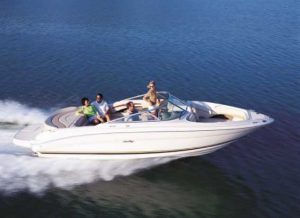The Most Common Boating Maintenance Issues & How to Avoid Them
Written with 360 Boat Finance
Aquamarine Repair Services & 360 Boat Finance look at some of the common problems with boats and how to avoid them.


Now, while this is an idyllic picture, we do need to point out that in order for there to be a successful day on the water, you do need to ensure that you are keeping your vessel in exceptional condition. This is so that there are no problems when you’re out at sea, on the lake or on the river! We wanted to address some of the common boating complaints in the hopes that it helps you to keep boating safely for longer.
Common Boat Problems and Solutions
Problem: Your Boat is Sputtering or Losing Power
When you’re out on the water and you feel like your boat is losing strength (and you’ve checked – you definitely haven’t run out of fuel), you are most likely facing a filter problem, or some fouled plugs.
What you need to do is to replace the in-line fuel filter. If you don’t carry a spare, you’ll need to clean the filter element of any kind of debris and to drain any accumulated water.
While it can be possible to buy a bad load of fuel, it’s far more likely that the fuel went bad in your boat. Don’t leave your boat near empty for long periods because this can cause condensation which equals water in your petrol, which is bad. If you’re storing your boat long term, you need to fill the tank, and if you’re not going to be using your boat for more than three months, you’ll need to consider a fuel stabiliser.
If you check and it isn’t a petrol problem, you might have an issue with your spark plugs. This is more common on older outboard motors but check it anyway.
Problem: Your Drive Belt Broke
You probably aren’t going to hear the sound of your drive belt breaking what with all the other noises going on, but you’re going to know about it when the overheating warning light comes on, or when your voltage metre shows that your alternator isn’t charging anymore.
A broken belt is unique to an inboard motor boat, and without a belt, you aren’t going to have an alternator or a water pump. You need to inspect, tighten and dress the drive belt regularly. Plus, check the condition of the contact surfaces, because corrosion can cause problems – even with new belts.
Problem: Your Engine is Overheating
So the gauge on your engine is rising, showing that your temperature is going up. You probably have a lack of water in the cooling loop.
Make sure you are using a salt neutraliser which will keep your impeller clean, and which will keep water passages clear within the engine. You can even invest in a system that can remotely inject into the inboard engines and which can neutralise the salt water. By stopping potential blockages in the heat exchange, you are keeping everything cooler.
Problem: Your boat won’t start
It’s probably one of the most frustrating things to turn the ignition and to hear nothing. This is most likely an electrical issue and something that requires checking at every juncture.
Check the kill switch, the shifter, the starter switch (it may be loose), the battery (and connections), and anything else it could be. If you need to make sure you’ll always be able to start your boat, perhaps you need to install a dual battery set up so you always have a backup.
Common Boating Maintenance Tips
When you are out on the water, you want peace of mind. Here are some common tips to ensure that your boat keeps on running.
Check Your Battery
You need to check and maintain your battery to ensure that it’s healthy. A battery can last from one to four years in your boat depending on the maintenance that you do on it. Make sure you check that it’s fully charging and that there aren’t any electrical items that are draining your batteries.
Flush Your Engine
Many people flush their engines with water but don’t use a salt neutraliser. You need to use a salt neutraliser that will stop calcium and lime build up and keep your engine running smoothly.
Use the Right Fuel Levels
When you have fuel at a low level in your boat, you need to ensure that condensation doesn’t build up. If you’re storing your boat, be sure to store it full of fuel and add a fuel stabiliser.
We hope this has been a helpful resource for common boating problems. By taking care of your boat, you can enjoy more time on the water for longer.
